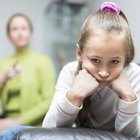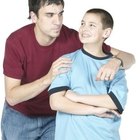
From a grade school child helping her preschool aged sister out on the playground to an older brother guiding his teen sib on college choices, and beyond into adult years, siblings can act as positive role models at any age. Siblings, according to University of Illinois professor of applied family studies Laurie Kramer, often play the role of guide, modeling informal behaviors and everyday social and emotional behaviors.
Keeping Cool
While parents play their own parts in helping younger children to develop appropriate social behaviors, siblings can act as role models in a somewhat different way. Unlike parents who may try to teach kids about social graces or acting politely, an older sibling can show her little brother or sister how to interact with other children at school or in other similar types of social situations. For example, when a first grader sees her tween sister hanging out with friends at home – hearing what they are talking about and watching how big sis handles this type of friendship activity – she is learning about age-appropriate social behaviors. This type of positive role modeling can go on into the teen and even adult years, with younger siblings watching their older brothers and sisters for cues on how to act in situations that range from the high school homecoming dance to a night out at a dance club with friends.
Siblings and Substances
A sibling can have a definite effect on his brother or sister’s substance use, according to researchers in the Journal of Studies on Alcohol and Drugs. While much of the research into this area focuses on the negative aspects of older sibling influence, this isn’t 100 percent absolute. Just like older siblings can positively influence a younger sib’s social behaviors, acting as a sober role model can make a difference. For example, if a younger sibling watches his older sib say “no” to drinking alcohol or using drugs he may feel more confident in his own choices to pass on substances. Additionally, a much older sibling can have an influence that is similar to other adult role models when it comes to substance use and abuse. Research on the effects that an adult can have on a child or teen shows that positive adult models can help reduce the risks of substance use such as alcohol, drugs or tobacco, according to Project Cornerstone from the YMCA of Silicon Valley.
Educationally Ahead
Having a supportive relationship with siblings can increase the likelihood of higher educational attainment. While other factors, such as the parents’ influences and the family's overall socioeconomic status, certainly impact a person’s educational attainment, an older sibling role model can provide a positive effect. For example, watching an older sister go off to college or complete her Ph.D. may inspire the younger sibling to do the same, following suit in the pursuit of higher education.
Copy Cat
Younger siblings often engage in copycat types of behavior when an older brother or sister is present. Although having a little brother or sister acting like your “mini-me” may seem annoying, it can actually have a positive result. From children to adults, imitating a positive older role model offers introductions to new experiences and provides a guideline to follow. For example, if younger sister is unsure as to how to dress for her first “grown-up” job, she may mimic the way her older sister dresses when she goes to work. While the older sister isn’t trying to impact her younger sister’s work wardrobe, by copying her the less-experienced sibling is learning everyday etiquette rules that she can use throughout her lifetime.
Related Articles

What Are the Benefits of Father Figures ...

A Brother's Influence on a Younger ...

Qualities of a Good Brother

The Roles of Older Siblings

Communication Between Older & Younger ...

The Importance of Father Figures

How Does an Overbearing Mother Affect a ...

The Effect of Teenage Pregnancy on the ...

Importance of Father & Son Relationships

An Abusive Father and the Effects on a ...

Signs & Symptoms of a Jealous Sister

Parental Rejection in Adulthood

School Uniforms Vs. Regular Clothes

The Effects of an Absent Mother Figure

The Definition of Non-Cognitive Skills

Positive and Negative Aspects of ...

Multicultural Activities for Infants

What Are the Effects of High School ...

Early Childhood Social Skills Needed to ...

General Characteristics of Emotionally ...
References
- University of Illinois: Siblings Play Formative, Influential Role as ‘Agents of Socialization’
- PubMed.gov: Similarities in Adolescent Siblings’ Substance Use: testing Competing Pathways of Influence
- US National Library of Medicine, National Institutes of Health: Adolescent Family Experiences and Educational Attainment During Early Adulthood
- YMCA of Silicon Valley: Adult Role Models
- Penn State University: Penn State News, Siblings of Influence
Writer Bio
Based in Pittsburgh, Erica Loop has been writing education, child development and parenting articles since 2009. Her articles have appeared in "Pittsburgh Parent Magazine" and the website PBS Parents. She has a Master of Science in applied developmental psychology from the University of Pittsburgh's School of Education.
Photo Credits
Jupiterimages/Pixland/Getty Images